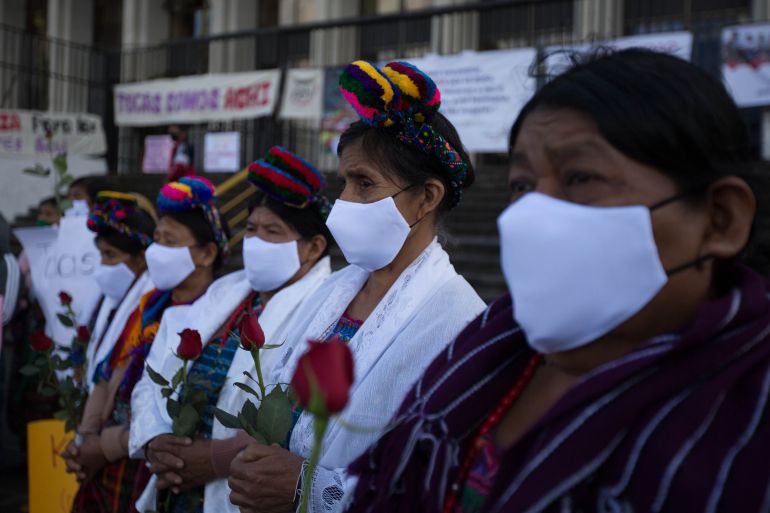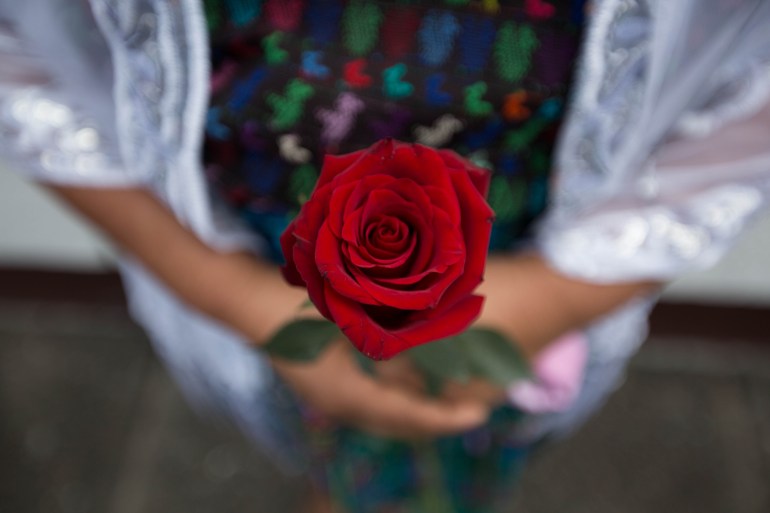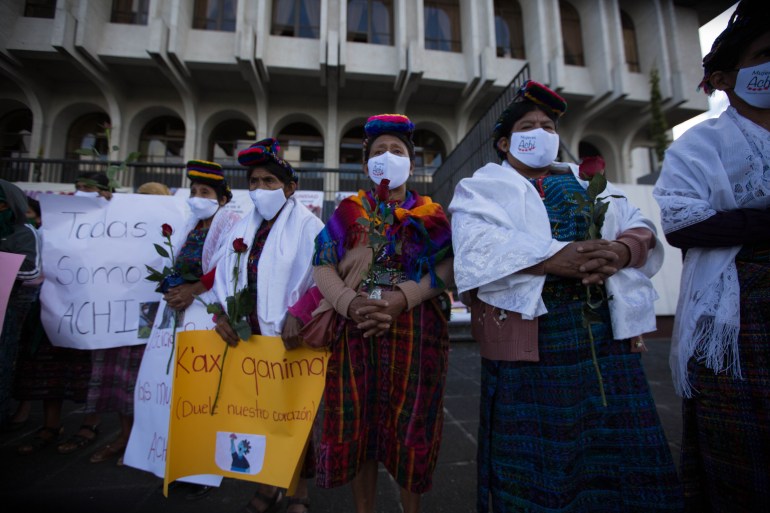Guatemala: Indigenous women celebrate ruling on sexual violence
Indigenous women and supporters welcome court ruling that found ex-paramilitaries guilty of rape, abuse during conflict.

Guatemala City, Guatemala – Survivors of Guatemala’s decades-long armed conflict have welcomed a Guatemalan court ruling that found five former paramilitary patrolmen guilty of raping and sexually abusing Indigenous women during the war.
Judges Yassmin Barrios and Gelvi Sical on Monday ruled that 36 Indigenous Maya Achi women had been subjected to domestic slavery, sexual violence and rape during the 36-year conflict, which pitted the Guatemalan military against leftist forces from 1960 to 1996.
Keep reading
list of 3 itemsGuatemalans still seek justice, 25 years after civil war’s end
Lessons from Guatemala’s painstaking search for the disappeared
The court sentenced five former members of the so-called “Civil Self-Defence Patrols” paramilitary group to 30 years in prison for crimes that took place in the early 1980s.
The Indigenous Mayan Achi women plaintiffs in the case are from villages around the municipality of Rabinal in Baja Verapaz department, about 176km (109 miles) from the capital, Guatemala City.
They spent years demanding justice for crimes committed during the conflict, which saw the Guatemalan government and military mobilise paramilitaries in their fight against leftist fighters in rural communities – and said this week’s ruling is a key step in the path to justice.

“I feel happy,” Pedrina Lopez, a 51-year-old Indigenous Maya Achi survivor and one of the plaintiffs in the case, told Al Jazeera outside the court in Guatemala City before the sentences were handed down.
Lopez was only 12 when she was taken and raped by the paramilitary patrolmen in her village in the early 1980s. “We did it,” she said, about the ruling. “We do not want what happened to us to ever happen again.”
Fight for justice
Lopez and the other women involved in the case faced an uphill battle in their quest for justice.
The court’s decision came 11 years after they first began to organise to seek justice. That was when lawyers in Rabinal began to find evidence of sexual violence through local women’s accounts of what had happened.
The court did not accept the case on multiple occasions, and in 2019, the accused were set free after Judge Claudette Dominguez ruled that she “did not believe” the testimonies. But the case advanced after the judiciary was changed upon appeal.
The Indigenous women had lived with their trauma for decades – even after the Guatemalan government and leftist forces from the Guatemalan National Revolutionary Unity signed a peace deal in December 1996 to end the fighting.
When Guatemala’s armed conflict came to an end with the signing of that peace accord, more than 200,000 people were dead, 45,000 were disappeared and more than one million had been internally and externally displaced. A United Nations-backed truth commission found that Indigenous Mayans accounted for 83 percent of the victims, while the Guatemalan military was responsible for 93 percent of all human rights violations.
“The pain never ended then, nor did it end with the peace agreements,” said Melissa Gonzalez, a psychologist from Rabinal who worked with the women involved in the case. “Forty years have passed since those events, and yet they continue to suffer accusations [against them], and they continue to suffer discrimination,” she told Al Jazeera.
“[The sentence] brings closure for them. A closure that lets them say that justice was done. It brings relief to their hearts, to their minds. They can look to heaven and tell their deceased [that] justice was done for their ancestors.”
Sexual violence as ‘strategy of war’
The judges on Monday sentenced brothers Gabriel and Francisco Cuxum Alvarado, their uncle Damien Cuxum Alvarado, and brothers Bernardo and Benvenuto Ruiz Aquino, each to 30 years in prison. Gabriel Cuxum was given an additional eight years for attempting to change his identity in order to avoid justice.
Lucia Xiloj, one of the lawyers involved in the case, said the decision meant that the voices of women who were abused and subjected to acts of violence during the conflict are finally being heard in Guatemala. “For the women, it has been very important to come to speak, to expose their truths, because it vindicates them before society,” she told Al Jazeera.
Since 2011, former military officials and paramilitaries have faced crimes against humanity charges, among others, which have helped to shed light on events that took place but had been seldom talked about.
Cases including the Mayan Achi women’s have highlighted how sexual violence was used by the Guatemalan military as part of its strategy during the war, as well. “All transitional justice cases have shown how sexual violence was used as a strategy [of war],” Ada Valenzuela, director of the National Union of Guatemalan Women, told Al Jazeera.
“The case of the Mayan Achi women puts the issue of sexual violence back on the stage and calls us as Guatemalan society to effectively understand that it was a constant,” Valenzuela said.
This is only the second time that former military or paramilitary members have been tried for sexual violence against women during the conflict.
In February 2016, Judge Barrios convicted former Lieutenant Colonel Esteelmer Reyes and former military Commissioner Heriberto Valdez Asij of crimes against humanity for their part in sexually enslaving 15 Q’eqchi’ women from the village of Sepur Zarco in eastern Guatemala in 1982. The pair were sentenced to 120 and 240 years in prison, respectively – and the case opened the door for more sexual violence victims to speak out.
“Sepur Zarco opened up the possibility that sexual violence can be proven – even though 30 or 40 years have passed – based on the testimonies and other types of expert examinations of the women in the communities to reconstruct history,” Valenzuela said.
Threat of amnesty
While these cases have reinvigorated survivors’ efforts to seek justice, in June of last year lawmakers from the ultra-conservative Valor Party presented an amnesty bill that would free all ex-soldiers and paramilitary members accused or convicted of crimes during the conflict.
It is the second such amnesty proposal in Congress in recent years, and earlier efforts have faced stiff legal challenges. In February 2021, the Guatemalan Constitutional Court, the country’s highest court, ruled against any proposed amnesty for human rights violations.
But some civil society leaders fear a new makeup of the Constitutional Court, which is now presided over by conservative allies of the military and the status quo, could see the amnesty legislation advance this time.
Any bill “that frees all those responsible for human rights violations in the country during the war would be a huge setback for the judicial system”, said Valenzuela, adding that it also would send a horrible message to the women who have fought for justice for decades.
“We cannot erase the past,” Gonzalez added. “We cannot forget something that caused so much damage.”
